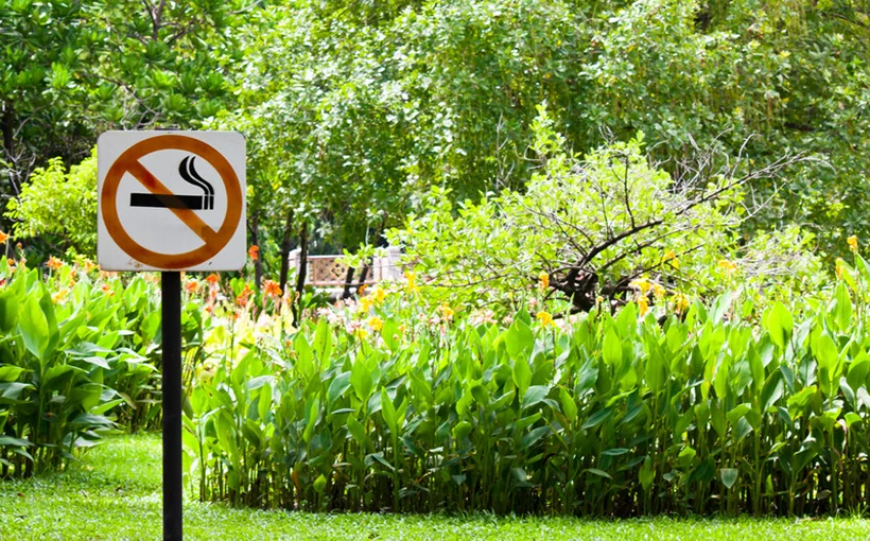Punjab Declares All Parks No-Smoking Zones Provincewide
The Punjab government has issued a sweeping rule declaring every public park in the province a smoke‑free zone, aligning with efforts to curb tobacco exposure and improve public health. Under the Prohibition of Smoking Ordinance 2002, the new directive extends existing bans from offices and transport hubs to reinforce smoking prohibitions in all recreational green spaces. Offenders face fines ranging from Rs 1,000 to Rs 100,000, depending on the frequency and location of violations.

The Punjab government has issued a sweeping rule declaring every public park in the province a smoke‑free zone, aligning with efforts to curb tobacco exposure and improve public health. Under the Prohibition of Smoking Ordinance 2002, the new directive extends existing bans from offices and transport hubs to reinforce smoking prohibitions in all recreational green spaces. Offenders face fines ranging from Rs 1,000 to Rs 100,000, depending on the frequency and location of violations. The initiative aims to protect children, families, and vulnerable citizens and is backed by a coordinated public awareness campaign.
-
Scope Expanded: All public parks in Punjab (Lahore, Rawalpindi, Multan, Faisalabad, Gujranwala, etc.) are now designated smoke‑free zones.
-
Legal Backing: Enforcement under the Prohibition of Smoking Ordinance 2002.
-
Strict Penalties: Fines between Rs 1,000 and Rs 100,000 for violators.
-
Targeted Locations: Includes playgrounds, jogging tracks, open-air lawns, and picnic spots.
-
Protecting Youth & Families: Aimed at preventing second-hand smoke in areas frequented by children.
-
Compliance Measures: Mandatory “No Smoking” signage and public reporting channels via the Smoke-Free Pakistan app.
-
Training & Oversight: Departments instructed to appoint focal persons to monitor compliance.
-
Community Role: Citizens encouraged to report violations through dedicated helplines or mobile apps.
Legal Framework & Administration
-
Punjab authorities reaffirm the application of the Anti‑Tobacco Ordinance 2002, previously limited to public transport, offices, hospitals, and schools, and now extended to all public parks.
-
High-level meetings chaired by Additional Commissioner Coordination Syed Nazrat Ali set enforcement guidelines and departmental responsibilities.
Enforcement Measures
-
Assigned officers are authorized to issue on-the-spot fines, confiscate tobacco products, or shutter offending premises.
-
Signage is mandated at every cigarette retail outlet, and bans are enforced within 50 meters of educational institutions inside park perimeters.
-
School Education and Environment Departments are instructed to nominate compliance focal persons and master trainers for awareness and enforcement.
Improved Air Quality in Recreation Zones
-
Eliminates second-hand smoke exposure in parks, protecting children, the elderly, and those with respiratory conditions.
-
Aligns with broader anti-smog policies and clean air initiatives in cities like Lahore and Gujranwala.
Reduced Tobacco Consumption & Health Hazards
-
Tackles one of Pakistan’s leading causes of illness—smoking-related diseases exceed road accidents and illegal drug mortality.
-
Creates healthier public spaces where smoking is socially discouraged.
Supports Clean Public Spaces & Recreation
-
Encourages families to visit parks without smoke exposure.
-
Reinforces the ethos of Suthra Punjab and other cleanliness campaigns promoting healthier urban environments.
Government & Regulatory Agencies
-
Punjab Health and Environment Departments oversee implementation.
-
Parks Authorities and Local Governments ensure signage, monitoring, and fine-levying mechanisms.
-
Education Authorities train staff and empower student groups to raise awareness.
Civil Society & Public Participation
-
NGOs and health advocates to support awareness, especially in rural and underserved areas.
-
The public is encouraged to use the Smoke-Free Pakistan mobile app to report violations.
-
Public Health Priority: Aligns with national goals to reduce the 160,000 annual tobacco-related deaths in Pakistan.
-
Strengthened Legislation: Builds on existing laws and broadens protections to cover leisure spaces.
-
Behavioral Shift Catalyst: Reinforces cultural norms against smoking where families gather.
-
Local and Search Impact: Keyword-rich article targeting phrases like “Punjab park smoking ban”, “Punjab smoke-free parks”, and “smoking fines Punjab”.
By declaring all parks as smoke-free zones, Punjab is taking a bold step toward protecting children’s health, improving air quality, and aligning everyday public life with global tobacco-control norms. The move complements existing bans in indoor public spaces and strengthens the province’s tobacco-control enforcement.

 Ateeq Ur Rehman
Ateeq Ur Rehman